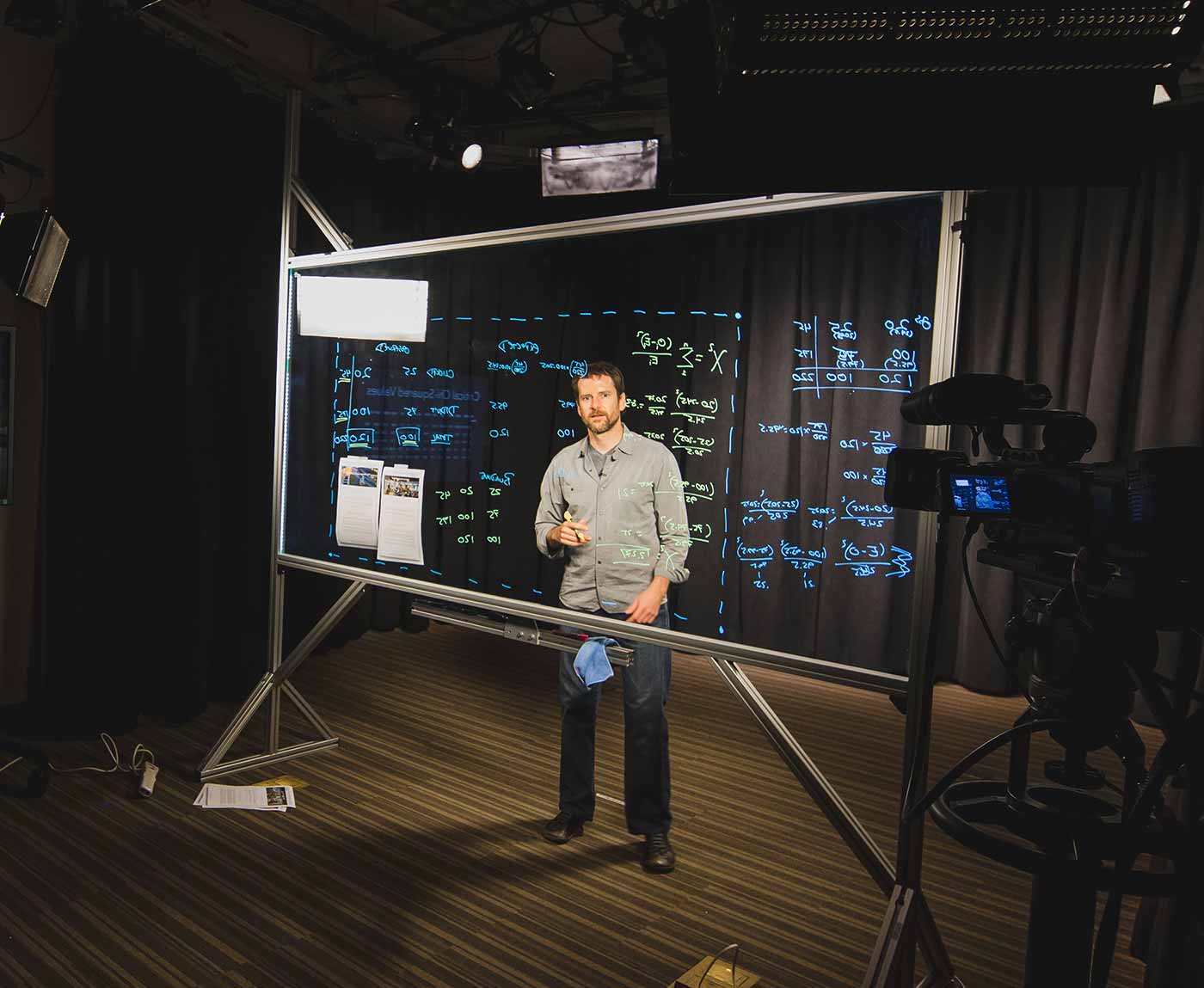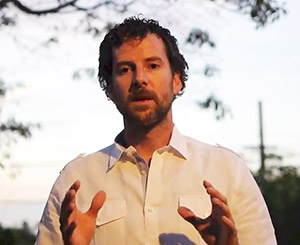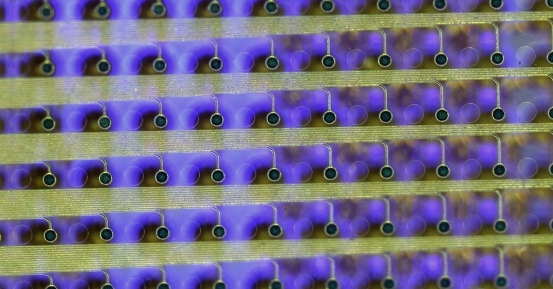
UC San Diego Offers Online Courses for Students Specializing in Interaction Design
Instagram co-founder to provide feedback on capstone projects
Published Date
By:
- Doug Ramsey
Share This:
Article Content

Professor Scott Klemmer recording one of his lecture modules for Coursera in the Qualcomm Institute HD Studio.
Learners around the world, regardless of background, will have the opportunity online to learn how to design great user experiences and what it takes to design technologies that “bring people joy rather than frustration.” The courses were developed by University of California, San Diego Professor Scott Klemmer, who will begin teaching the sequence of seven online courses on “Interaction Design” on the Coursera platform on June 24.
Klemmer is a professor of cognitive science in the UC San Diego Division of Social Sciences as well as computer science and engineering in the university’s Jacobs School of Engineering.
The sequence of courses is the first offered by UC San Diego on Coursera since the platform began offering specializations in 2014 for closely related courses – allowing students to master a skill and apply it to a capstone project. Although the courses do not count for credit at UC San Diego, students passing all the courses and getting a Verified Certificate for each can complete a capstone project to earn a Specialization Certificate that demonstrates mastery over the broader skillset.

Still frame from Scott Klemmer’s introductory video to the Specialization sequence of seven courses and a capstone project
“Design is a critical component of the development process in every industry, so we took this opportunity to create a sequence of courses open to everyone, with no particular background required,” said Klemmer, who is also associate director of the Design Lab at UC San Diego. “We are also delighted to be partnering with Instagram co-founder and Director of Engineering Mike Krieger.”
Instagram’s Krieger helped Klemmer (his former professor) create the requirements for the final capstone project: to design a creative, end-to-end social user experience using professional interaction design and user-experience (UX) tools. Krieger and Klemmer will judge the projects and provide personalized feedback to the creators of the best designs.
“Here you get to do an open-ended project where you get to show the world and yourself what you can do with all these design materials,” said Klemmer. “This is a great opportunity to put together a portfolio piece or something you can use to impress your family and friends, or get a job in the design field.”
The full sequence of courses is geared toward students who want to be designers or product managers, but it’s open to anyone. Klemmer covers key elements in the design process. “We start out with need-finding, go through rapid prototyping, make something that is higher fidelity, and test it both in-person and online,” explains Klemmer. “Then students can revise and iterate while polishing the design. Students will be able to experience the whole cycle in the specialization.”
Students learn techniques for brainstorming and generating ideas, how to prototype designs rapidly before implementing them, and how to gather meaningful feedback from users. Students also learn principles of effective visual design, perception and cognition, and how to organize a team’s design process to maximize creative output.
The seven courses will cover:
- Human-Centered Design: An Introduction
- Design Principles: An Introduction
- Social Computing
- Input and Interaction
- User Experience Design
- Information Design
- Designing, Running and Analyzing Experiments
The courses are self-paced, with an estimated workload of 10-12 hours per week. The lectures are pre-recorded and they don’t have to be taken in order, although initially only the first two courses are available. Course three is due in July, course four in August, and the remaining courses in the fall.
Klemmer is a big believer in the studio model of education. “I was originally trained as a designer, and in the studio model of education where everybody works together and you can see what everyone is doing, and every week people tack things up on the wall and everyone discusses and critiques it,” Klemmer said on BBC’s The Forum program in May. “You learn so much and it’s inspirational, so when I became a computer scientist, I did everything I could to bring that model into engineering classrooms” – and to online learning. To achieve the studio model with potentially thousands of students, each student will be expected to upload their assignments and projects for comment by their fellow students.
Once all seven courses have been completed, students will be eligible to take the final assignment involving a capstone project to demonstrate the knowledge they have acquired in a specialization by applying those skills to a final project.
Students who are not interested in getting certificates at the conclusion of each course or the full specialization are welcome to take the courses free of charge. For those interested in the Verified Certificates from UC San Diego and Coursera, the fee is $39 for each course and capstone project, which can be paid per course (and Coursera offers financial aid for people who cannot afford the fee). Alternatively, students can get a 10 percent discount and prepay $280 for unlimited access to all seven courses and project.
This course is an initiative under the UC San Diego Office for Online and Technology Enhanced Education, which coordinates campus education efforts in the online arena. The office, part of the Teaching and Learning Commons, is closely aligned with the Commons’ goals of supporting both instructors and students.
To learn more about the Interaction Design Specialization or to register, click here.
Share This:
You May Also Like
Stay in the Know
Keep up with all the latest from UC San Diego. Subscribe to the newsletter today.


